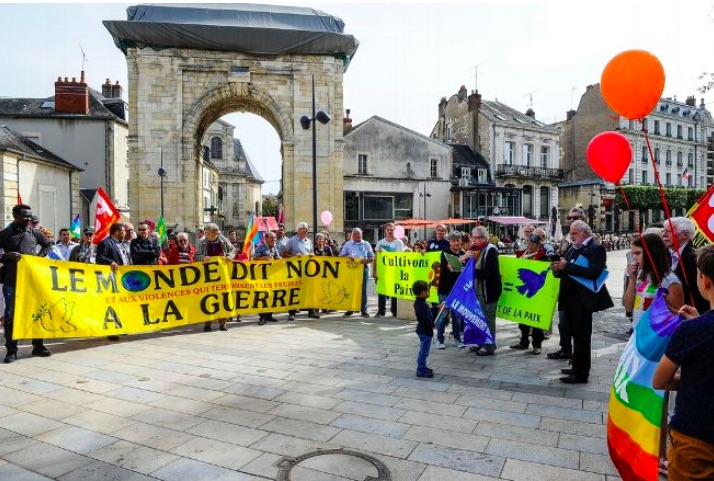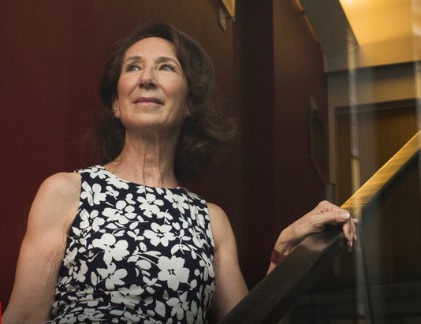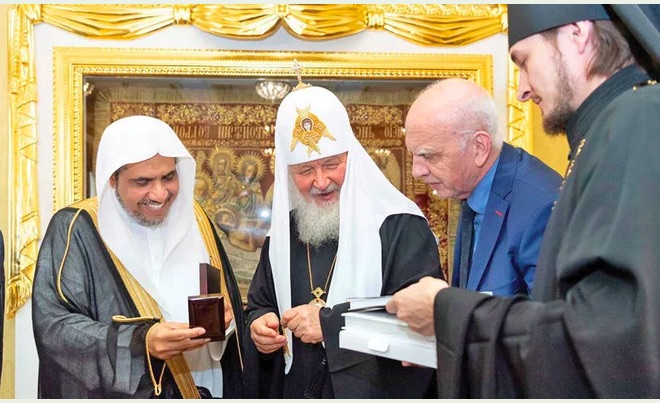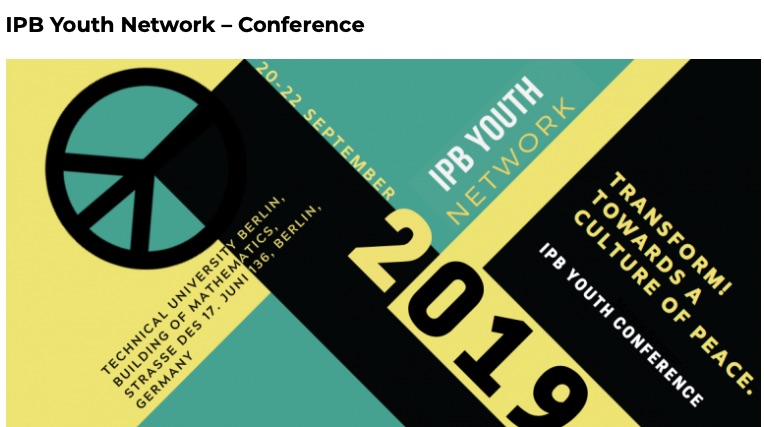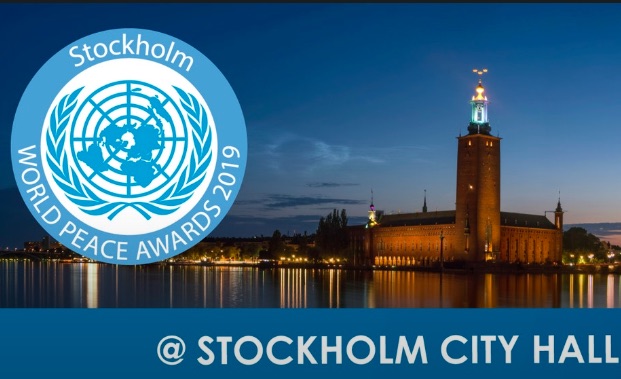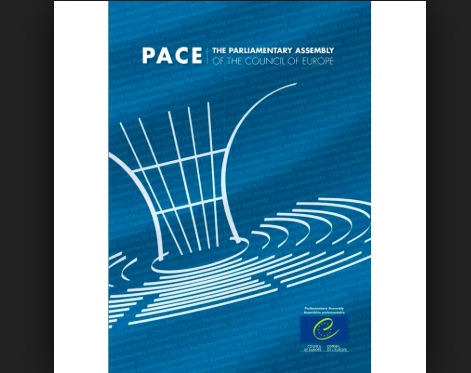FREE FLOW OF INFORMATION
A survey by CPNN
The following 61 actions in 6 countries formerly part of the Soviet Union were listed in Google during the week of September 21-28 under the key words “Международный день мира” and “Міжнародний день миру”as well as “International day of peace”.
In addition to these, 15 actions are listed on the maps of One Day One Choir and Montessori schools singing for peace, but there is no indication which took place this year and which took place only in previous years.

Many cities and towns on both sides of the war in Ukraine continue to demonstrate for peace, like in this photo from Zhytomyr. The letters spell out “We are for peace”
Here are excerpts from articles about the actions as translated by CPNN:
AZERBAIJAN : On the occasion of the International Day of Peace, Azerbaijani musicians have given a concert titled “For Peace” in the Carriere-sous-Poissy commune in north-central France. Organized by the mayor’s office of the commune and Azerbaijani pianist Saida Zulfugarova, the concert featured works by famous classical composers of Azerbaijan as well as mughams.
BREST, BELARUS : This year, our most peace-loving traditional action in Brest in support of International Peace Day will be held again at the sports complex – the Brest Regional Center for Olympic rowing reserve. In addition to the traditional concert part with the participation of young performers of the ArtPipper creative center, Anna Musvydas Art Studios, MagaliFF vocal studios, the May Baby and BOOM educational centers, a dance marathon will be held as part of the most peaceful day in Brest, attention to the weighty list of participants, which by the time of the meeting will probably become even larger: . . . As before, the culmination of the event will be the lighting of lamps, brought by Brest residents to an impromptu “Alley of Peace”, accompanying this ritual in memory of all those who died in various modern military conflicts on the planet that arose in the past year as a “round dance of the world”. . . .
MINSK, BELARUS : A festive action took place on the eve of International Peace Day at the regional Palace of Children and Youth Creativity . . .By tradition, the organizers and guests of the festival performed a large peacekeeping concert and the laying of wreaths at the Eternal Flame took place. The most important words that sounded on this day were “peace”, “accord”, “friendship between nations”. This year alone, the activists of the fund held about 70 marches, festivals, festivities, celebrations and other significant events that received a wide public outcry. It is significant that 60 – 70% of their participants are young people: schoolchildren and students, representatives of production teams. . . .Today in Minsk, in the White Hall of the All Saints Memorial Church, where the Belarusian Peace Fund celebrates, representatives of the UN and UNICEF will gather in Belarus, heads of many ministries and departments, heads of religious denominations and the public. Among them are young peacekeepers of the Gomel region – winners and prize-winners of the republican drawing contest among students “Happiness live in a peaceful country!”. These are Diana Moroz from the Mozyr Center for the Creation of Children and Youth, Yevgeny Bozhenkov from the Tikhinichi Children’s Art School of the Rogachev District and Stanislav Strelchenya from secondary school No. 9 in Mozyr.
MOGLIEV, BELARUS : On September 17, 2019. a festive event dedicated to the International Day of Peace was held on 30th Victory Street, 34 in the Leninsky district of Mogilev. . . .Volunteers of the Lenin ROO “Belarusian Republican Youth Union” removed and decorated the yard and carried out the action “Day of Peace and Goodness”. . . The program “Peace Weeks” includes exhibitions of children’s art and contests of children’s drawings “Peace through the Eyes of Children”, thematic excursions, sports relay races, and conversations on the topic: “Peace is happiness for people!”
ALMATY, KAZAKHSTAN : The School of “Society, Technologies and Ecology” in joint efforts with UN Information Office hosted a panel discussion devoted to the celebration of the International Peace Day. The event started with a minute for the memory of victims of all wars and conflicts. Right after the opening remarks by Dean Ewan Simpson, an adviser to Sustainable Kazakhstan Research Institute, Mr. Brendan Duprey opened the flow of discussions with comprehensive presentation about the SDGs, elaborated with data about climate change and its impact on world security. . . . It worth mentioning that earlier Narxoz students were invited to participate in the “Climate Action 4 Peace” essay contest to celebrate the Peace Day. In their essays they vocalized their take on all above matters. More than 20 applicants who tried their luck in the contest received valuable prizes today. Let us congratulate following students who did an outstanding job in this contest:
1st place – Vadim Melyakov
2nd place – Kyamran Mirzoyev, Katrin Wrulich
3d place – Arailym Zhetkerbayeva, Yerkebulan Turganbay and Zarina Laiykova
BISHKEK, KYRGYZSTAN : This year, International Peace Day is dedicated to combating climate change for peace.. In honor of this significant date, the action #GlobalClimateAction took place in the capital. The protesters took to the streets of the capital to remind everyone to stop climate change through the efforts of each of us, through conscious consumption, saving resources and eco-habits.
GYMNASIUM OF ARZAMAS, RUSSIA : Role-playing game “UNEP Model” on the theme “Climate Change. What to do?” is devoted to the 20th anniversary of the Declaration and Program of Action for a Culture of Peace.
Founder: International Movement of Young Peacemakers and Schools of Peace.
The presentation of the game is held in the format of a Skype conference on September 23, 2019 by the Gymnasium of Arzamas with the support and assistance of the Museum of Peacekeeping Operations (Solnechnogorsk), SPC “Mirotvorets” (Moscow), the Hamburg Club and other organizations.
Participants in the Skype conference: young peacemakers, schoolchildren and personalities of Russia, Belarus, Germany, Italy, Thailand, Kazakhstan, Belgium, Norway, France, Sweden.
CHELYABINSK, RUSSIA : September 21 we will celebrate International Peace Day. An important holiday will be held this year under the slogan “Fighting climate change for peace”. On the eve of International Peace Day, September 19, in the capital of the South Urals, a special “peaceful” master class will be held. “Pupils of the social and rehabilitation center of the Kurchatov and Leninsky districts, under the guidance of specialists, will paint eco-bags with patterns. The theme of the drawing will be dedicated to Peace Day , ”said Elena Morozova, coordinator of the Blago74 information center.
KAPOTNYA: RUSSIA : Kapotnya celebrates International Peace Day with a concert. The event will be held in the premises of the Central Commercial Center “Maryino”.
KOROLYOV, RUSSIA : Tomorrow, September 21, will mark the International Day of Peace. And today, students of the Korolev Children’s Art School dedicated a concert to this topic.
MOSCOW, RUSSIA : White cranes and meetings with heroes: this is how schoolchildren celebrated International Peace Day in different parts of the capital. At a school in 1532 in the district of Teply Stan, the children staged a flash mob called World Peace. All students joined hands together. In a school in 2025 in the Ochakovo-Matveevskoye district, high school students by means of an open-mic discussed terrorism and security issues and collected signatures for the symbolic petition “I AM FOR PEACE.” And in the elementary grades, “Good Lessons” were held, where the children enjoyed making peace symbols – white doves of paper. In addition, a competition of drawings on the sidewalk: “Peace to the children of the world” was held. And at school 1280 in the Academic district, second-graders also made symbols of peace – white cranes. Pupils of school 41 in the Vnukovo region met with the honored pilot of the USSR Alexei Timofeev and opened an exhibition of thematic drawings. The School named after F.M. Dostoevsky in Lublin hosted an interactive holiday “Games of countries and peoples.”
NEKRASOVKA, RUSSIA : Nekrasovka will celebrate International Peace Day. The festive concert will take place in the Zarechye culture house, located on 1st Volskaya Street. Everyone is welcome on Friday, September 20. Beginning at 18.00. Free admission.
SARATOV : Schoolchildren of Zavodskoy district will celebrate International Peace Day on the stage of the City House of Culture of National Creativity at 13:00. Children and guests of the event will be told about the history of the holiday and its attributes. Footage on the scenes of war and peace will be shown on a large screen, as well as poetry and songs. At the end of the day, students will be invited to join hands with all the people of the planet at the ringing of a bell and make a wish for world peace.
SEVASTOPOL, RUSSIA : Thematic program dedicated to the International Day of Peace “We are for peace on earth!” 10:00, at the area of the DKR,st. Korchagina, 1.
SHADRINSK, RUSSIA : Today, September 20, in the Shadrinsky city garden, a large-scale action “We are for world peace” took place. It was initiated by activists of educational and cultural institutions, volunteers and students with the support of the Youth Policy Committee of the City Administration. Everyone could become direct participants in the mass flash mob, lining up in the shape of a dove – a symbol of peace.
SOKOL, RUSSIA : International Peace Day will be celebrated in Sokol. A festive flash mob will take place at the Sokol Family Center. This was told by employees of the institution. “First, the children will play a little to warm up, and then they will learn movements and dance together with fun music,” said one of the organizers of the holiday. The event is scheduled for September 24, 14.00. A flash mob is scheduled for students in grades 5-7.
ST PETERSBURG, RUSSIA: September 21 at 12.00 in the exhibition hall of the Union of Artists of St. Petersburg (Bolshaya Morskaya St., 38) will be a holiday “St. Petersburg – our peaceful home”, dedicated to the International Day of Peace. The program of the event is scheduled to show video materials on the International Day of Peace, a multimedia exhibition of educational projects on the interethnic and intercultural dialogue of St. Petersburg and the art exhibition “Dialogue of Cultures”. The event is organized by the Association for the Development of Science, Education and Culture “Continuing Education” with the support of the Committee on Interethnic Relations and the Implementation of Migration Policy in St. Petersburg.
Admission to the holiday is free.
ST PETERSBURG, RUSSIA: In St. Petersburg on Saturday, September 21, an uncoordinated “Peace March” took place. Several dozens of participants went through the central quarters of the city – from Nevsky Prospect along the Griboedov Canal, and then through St. Isaac’s Square to the Admiralty The action in St. Petersburg is timed to coincide with International Peace Day. Its participants demand to stop the war in Ukraine, Syria, as well as limit the militarization of Russia. At the Admiralty building, where some protesters stopped with posters, police detained three people. According to the Mndiazona correspondent, a man and woman from the Democratic Petersburg movement were detained, as well as another activist who stood with a solitary picket in the garden.
TSKHINVAL, OSSETIA, RUSSIA : “War is not an option, any situations can and should be resolved peacefully,” said Sergey Skvortsov, head of the Rossotrudnichestvo representative office in South Ossetia during a festive rally dedicated to Peace Day. The event was organized on the Cathedral Square in front of the Church of the Holy Virgin in Tskhinval. A festive banner and an audio system were installed near the square. At the beginning of the action, after a welcoming speech by the hosts, boys and girls went out to the microphone to read poetry. Elina Gakoeva, a participant in the Livadia Forum, read out an appeal in which there were calls for peace to abandon the war and seek friendship. According to one of the traditions of the international holiday, at the end of the rally the bell in the church of the Holy Mother of God struck 11 times to commemorate 11 years of peace in South Ossetia. At the end of the event, white balloons and pigeons were released into the sky.
VOLGOGRAD, RUSSIA : Bells will sound in Volgograd on Peace Day The annual international bell of peace will be held in Volgograd for the sixth time, organizers told the City of Heroes news agency. On September 21 at 12 o’clock the Komsomol Garden of the Central District will be filled with jingle bells. This tradition – to celebrate Peace Day – was invented at the Lyceum No. 5 named after Yuri Gagarin. The world’s first bells were sounded in Volgograd in 2013, and the next year the action became international. “If you ring the bell at one time in all corners of our planet, then this chime can become the voice of peace, memory and joy,” says Larisa Tropkina, director of Lyceum No. 5 . – We invite all inhabitants of the planet on September 21 at noon on International Peace Day in all schools to ring the bells. This will prove that we do not want war and we wish the whole world happiness.
YEKATERINBURG, RUSSIA: In Yekaterinburg, Ural Federal University students celebrated World Peace Day with an flash mob – they made up words in the form of a heart in the hostel No. 8 from lit windows at night
ZYRYANSK, RUSSIA : On Sept 20 the action will take place in two venues 1. A survey of the population of the village of Zyryansky, creating a poster “What is peace for you?” based on the responses of the survey participants. 2. Drawings on the pavement “My Peace” near the central playground with the involvement of children and their parents.
BEREGOVO, UKRAINE: The International Peace Day was dedicated this year to the All-Ukrainian action “Dove of Peace”, which was joined by students of the Berehove Professional Lyceum of Services. Within the framework of the action, the students produced paper doves as a symbol of peace. The doves were made of different colors, but most were white and the colors of our flag, which symbolize harmony, understanding and unity.
BEREZAN, UKRAINE : Every year on September 21, people in different corners of the globe celebrate the International Day of Peace, a holiday designed to make everyone think and do something for the sake of peace on Earth. Peace in native Ukraine is the most cherished desire of all Ukrainians, who express their voice as cohesively as never before. Every year our school joins the celebration. The elementary school students held an action and created the project “Children of Peace – for Peace!”, Each of which stated that life on Earth was the most important price. Conversations and hours of communication on the topics were conducted in the classes: “Peace begins with me”, “Peace on the planet – happiness to all children”. During the breaks, the students’ self-government leaders organized and held a “dance flash mob“ Children of Peace for Peace! ”For the students of the school.
BEREZAN, UKRAINE : Svetlana Kolga, Social Work Specialist of the Social Support Sector for Children and Family Services of the Berezan City Counci,l held an educational event at the Sadovska School of Law l – lll Art. for students in grades 3 and 4 on International Peace Day, which has been celebrated around the world at the initiative of the UN General Assembly since 1981 on 21 September. This day prompts reflection on the problems of peace, calls for a halt to hostilities and a renunciation of violence and fire . The educational event was attended by 38 children, who also drew drawings for the International Day of Peace.
BILA TSERKVA, UKRAINE : For the International Day of Peace, lyceum students of group 11 prepared a video “We vote for peace!”. Pupils of the 5th grades organized flash mob “Bell of Peace”. Traditional for our students was the action “Dove of Peace”, during which the students made doves by different techniques and write on them the wishes of peace, kindness, happiness for each other and all Ukraine. We sincerely wish every Ukrainian to truly feel that such a peaceful sky is over their heads!
BOROTINSK, UKRAINE: The Rovantsev School has joined the celebration of International Peace Day, which is traditionally celebrated in September. On the occasion of the holiday, the students, together with the teachers, organized a flash mob and organized a patriotic action “Dove of Peace” to once again express their desire to live in peace: “We want every Ukrainian family to feel the highest value of peace today, which is the key to a happy life” .
(Survey continued in right column)
Question for this article
What has happened this year (2019) for the International Day of Peace?
(Survey continued from left column)
CHERKASY, UKRAINE : On September 21, International Peace Day is traditionally celebrated around the world. Every year, high school families come together for various activities to achieve a common goal – to demonstrate their unity and a strong position on world peace. On the morning of September 20, all students and high school students had the opportunity to listen to radio announcements about traditions and the purpose of the holiday. Classes 4-5 during the day participated in the chalk competition on the board “We wish Ukraine peace”, the winners were students of class 5A (class leader Omelyanenko OM) and honorary II place, with a difference of several points, took students class 4A (class leader Sitnik TV). High school students in grades 6-9 took an active part in the Peace Festival. The combined teams played a QR-quest, prepared by teacher-organizer Suhenko KO. and the gymnasium parliament, the winners were the class 7A high school students.
DNEPR, UKRAINE : On September 21, Dnepr schoolchildren celebrated World Peace Day with a flash mob. Pupils of school number 133 made a formation in the schoolyard in the shape of a dove of peace, holding a yellow-blue ribbon in its beak. In addition, a peace lesson was held in each class, where the students cut out doves from white paper and also made posters for peace.
GORODOK, UKRAINE : On September 21, International Peace Day is celebrated around the world . On this occasion a march for peace was held by children, teachers, parents of Gorodotsky Lyceum # 1 and employees of the department of education of Gorodok city council. Marchers passed the column on Grushevsky Street to the central square of the city, walking to the building # 2 of the Lyceum and then to the building # 1 with the aim of demonstrating their involvement in peace-seeking for everyone family, every family, peace in the country and peace in the world.
IVANICHI VILLAGE, UKRAINE : On the occasion of the International Day of Peace and in order to form national-patriotic feelings among schoolchildren, a number of activities were carried out with the students of the school-gymnasium aimed at focusing on the problem of peace in the world and effective means of achieving it.
Peace on earth is peace and quiet
It’s childish laughter and soul flying!
When the poet writes magic poems
About an unusual, wonderful world.
KHARKOV, UKRAINE : As in previous years the students and teachers of our school are involved in events on International Peace Day! For the fourth year in a row, our school has been awarded the Peace School Certificate and is actively involved in peacekeeping actions. This year the classroom leaders held thematic lessons and activities and pupils from the 4-11 classes together created a bright thematic poster, where they expressed their desire for peace in the Ukraine!
KHARKOV, UKRAINE : Every year, September 21, the International Peace Day is proclaimed worldwide, proclaimed by the UN General Assembly as a day of global ceasefire and non-violence. The most important for Ukrainian society today is the topic of war and peace in connection with the conflict in eastern Ukraine. The thematic exhibition “May peace be on earth” at the socio-cultural center presents literature on the military conflict in the Donbass. Visitors may be interested in the following editions: OO Kalinovskaya «The Unannounced War. Unknown facts and chronicles of the anti-terrorist operation “, Yu. B. Skobalo” The war did not put us on our knees “, V.Yu.Markitantov” Russian hybrid war: from doctrine to tactics “, VI Golovchenko” Hybrid war of Russia against Ukraine: historically – political research “, VP Gorbulin” World Hybrid War: Ukrainian Front “, etc. Exposure period: from September 17 to October 26.
KIEV, UKRAINE : Starting from 2002, every September 21st is the International Peace Day. Its program on this important holiday for Ukraine will be in Kiev, and the events will begin in the early morning.
Representatives of the UN will also take part in the celebrations. This was reported by the Informant with reference to the official website of the Kyiv City State Administration.
Participation in the action, which this year will be called “Peace and Unity for Ukraine,” in addition to a variety of officials, will also be attended by public organizations, veterans, people with disabilities, women, soldiers in the ATO (anti-terrorist operation), as well as youth. The full program of events for this day is as follows:
09:00 (Lavrskaya street, 27) – gathering participants, laying flowers at the Memorial (monument) to Ukrainian soldiers who died in Afghanistan;
09:30 – the solemn procession of the participants of the action from the Memorial to the National Museum of the History of Ukraine in World War II;
10:00 – an action of peace in the square near the National Museum of the History of Ukraine in World War II.
KIEV, UKRAINE : An event to celebrate International Peace Day will be held in the Art Hall (Room 63) of the Institute of Philology on September 23, 2019 from 12:50 to 14:30. Participants and guests: representatives of the Kyiv City Center of the Kyiv City Center for Assistance to the Anti-Terrorist Operation Participants, NGO “Council of Veterans of ATO of the Dniprovsky District of Kyiv”.
KOVEL, UKRAINE : On September 21, International Peace Day is traditionally celebrated around the world. For some, the world is an everyday reality. The streets are quiet, the kids go to school, and the homes are not threatened by enemy shells. However, for many people in the modern world, peace is only a dream. These people are constantly living in fear and an atmosphere of instability, for them every day may be the last. It is for such people that this holiday exists. The lyceum students know and respect the important dates and in honor and memory joined a flashmob called “We for Peace”, thematically finishing the doors of their classrooms, thus showing respect for the people who struggle and work for peace in all over the world.
KREMENCHUK, UKRAINE : September 21 is International Peace Day. Representatives of city authorities and foreign delegations planted symbolic “trees of peace”
KUPYANSK, UKRAINE : On September 21, 2019, an information minute for students of grades 1-11 was held at Kupyansk NSC # 2, on the eve of International Peace Day. Throughout the day, students and teachers took part in the “Blue Dove” flashmob – each one, as a sign of commitment to the holiday, pinned on his breast a white dove made by himself. During the breaks, students and teachers joined in creating a collage “Peace is ..” where everyone was able to write what the word “peace” meant to him. Pupils of 1-4 classes took part in drawing on the sidewalk. They finished the day on the square in front of the institution, where they released doves into the sky as a symbol of peace and harmony in our beloved Ukraine.
KVASILOVSKY, UKRAINE : On the occasion of International Day of Peace (September 21), a festive physical and musical composition “I want peace!” was played as educators expressed their irreversible and fervent desire for peace in Ukraine (instructor in physical education Momotok TR , music directors : Denisyuk OM, Rever OE ) All those present had tears in their eyes as they watched the childrens’ movements and sincere intentions to reach out to us adults: “I want peace! I don’t want to hear the word “war”! “..
LIPCHA, UKRAINE : Grade 3 students held a Flashmob “We are for Peace.”
LISICHANSK, UKRAINE : International Peace Day is celebrated around the world on September 21st. Our school also hosted events dedicated to this holiday. Pupils and teachers gathered for a school-wide lesson “May peace be in our native Ukraine”, which has become traditional. In the lesson, all students read poems about peace and friendship, became acquainted with the history of the International Peace Day, with important world problems that need to be resolved to preserve peace on Earth. After the lesson, all the students took to the festive line “Peace to All”, for symbols of peace were specially prepared. Elementary school students walked the festive walk around the school, urging adults to a peaceful life. On the ground floor there was an exhibition of paper doves “Under the peaceful sky”.
LVOV REGION, UKRAINE : The students of our school joined the My Peace Ukraine campaign. They made and attached a dove as the symbol of peace. May the childrens’ sincere desires of peace come true !
LYUBESHIV REGION, UKRAINE : Lyubeshiv Technical College held an action dedicated to International Peace Day. Teachers, students and students of the college have woven a wreath of peace from the autumn flowers, to honor the memory of the fallen soldiers, fighters for peace and freedom.
NIZHYN, UKRAINE : Today, as part of International Peace Day, the college’s student team has joined the All-Ukrainian Dove of Peace Campaign.
ODESSA, UKRAINE : Today, on September 20, on the eve of International Peace Day, Sergei Grinevetsky, as an honorary member of the Presidium of the Odessa Regional Peace Council, participated in the opening ceremony of the Peace Square.
SHEPETIVKA, UKRAINE : In celebration of the International Day of Peace, September 20, 2019 in the Secondary School I-III. #3, a Global Climate Action was held, “Fighting Climate Change for Peace”. The children made the symbols of peace – paper doves, and put them on the walls. “Ukrainian children are for peace in the world !!!” and decorated their classrooms and school grounds, gave the doves to passers-by, with wishes of peace, kindness and understanding. Senior students honored the memory of the heroes by laying flowers near the memorial “Fighters for Freedom and Independence of Ukraine”.
SLAVYANSK, UKRAINE : International Day of Peace at School N23 for children with visual impairment in Slavyansk was marked with a flash mob.
SUMY, UKRAINE : Sumy Regional Center of Blood Service organizes the action “International Day of Peace”. In the holiday program: Free Hugs; Gifts; Holiday concert; Drawing contest; Plus, delicious candy and a great atmosphere! Come with your family and take your friends! Location: Shevchenko Square. Start: 11:30. For a video click here.
TERNOVSKY DISTRICT, UKRAINE : An information hour entitled Right to Peace was held today, the International Day of Peace, in the municipal institution “Territorial Center for Social Services (Provision of Social) in the Ternovsky District” of Kryvyi Rih City Council for day care units with the participation of specialists of the library-branch # 29.
VASYLKIV, UKRAINE : For the International Day of Peace, students of Vasylkiv NSC “Gymnasium of Secondary School I-III degrees №8”, who are running for the post of Chairman of the Student Council, presented their interesting and creative projects on the theme “My Peace Program”! During their election campaign, candidates from each class showed their enthusiasm, creativity, sociability and a desire to help others. It was on International Peace Day that their election campaign ended. Social videos were also made by the students in support of their candidate. Their active positions attracted not only the student and pedagogical team, but also the parents who support their kids and help with their exciting projects. “Only those with peace in themselves can make peace in the world! So let us sow peace together good and eternal!”
VINNYTSA, UKRAINE : Social action for Peace Day was held on September 20 at the European Square in Vinnitsa. The event was organized by the NGO “Vinnytsia Regional Council of Women of Ukraine”. It was attended by the Deputy Chairman of the Regional Council Mykhailo Kremenyuk, volunteers, displaced persons, soldiers in the ATO / OOS (anti-terrorist operation), students and students.
– Unfortunately, it happened that without the shots, we would not have felt the real thirst for peace. We have a war, the best sons of Ukraine are killed every day, ”Mykhailo Volodymyrovych said in his speech. – But I am optimistic and confident that some time will pass and the long-awaited peace in Ukraine will come. Peace is through negotiation, not capitulation. Sincere words of gratitude to the people who are defending the border today – our servicemen, volunteers who selflessly give their time and health to helping our heroes. I wish our youth growth in a prosperous, peaceful and rich state. During the action, with a moment of silence, all present honored the memory of the fallen heroes. The active participants of the event were children who presented amateur performance numbers dedicated to patriotic topics. The symbol of peace was the hundreds of yellow and blue balloons they released into the sky. During the event flowers were laid on the memorial sign of Heavenly Hundred and the fallen heroes of the ATO / OOS.
ZHYTOMYR, UKRAINE : At the Zhytomyr College of Trade and Economics, today, September 20, on the eve of International Peace Day, a college action “WE ARE FOR PEACE” took place in the college, which was attended by students and teachers. The initiative to hold a challenge among students and the administration of the college belongs to student self-government. The beginning of the action was a photo of representatives of the Student Council, at which they called for peace. Subsequently, students from all college groups made their call to peace and passed the baton to the next group.
ZOLOCHIV, UKRAINE : In the Zolochev GZSO I-III classes. students together with teachers Ulyana Stadnik and Mariana Yasinovskaya held a flash mob on the occasion of Peace Day. The director of the school Pylypchuk Oksana Nikolaevna congratulated everyone on the holiday. See the video for more details.
(Note: the following cities are claimed by the Ukraine, but have declared their independence as the Donetsk People’s Republic or the Lugansk People’s Republic.)
ANTHRACITE : On September 20, educational institutions of Anthracite and Anthracitovsky region joined the international campaign “United Hour of Spirituality“ The Dove of Peace ”, which is aimed at consolidating the efforts of all concerned people to strengthen friendship and cooperation between states, preserving the memory of the heroes who gave their lives for peace.
AVDEEVKA: In Avdeevka, which has repeatedly come under fire, where they still hear gunshots and heal wounds (there are still a lot of houses destroyed and damaged by shelling), there is a special relationship to World Peace Day. It was expressed yesterday by students of school No. 7. The students made paper doves (a symbol of peace), wrote on special sheets (along with parents and teachers) what they were ready to do for peace, and also arranged a dance flash mob on the street.
DONETSK : On the eve of the International Day of Peace, which is celebrated annually on September 21, in the Donetsk House of Culture. Kuybyshev hosted a special event for the cancellation of postal stamp No. 33, International Peace Day. According to the correspondent of the official website of the Donetsk People’s Republic . . . The postal stamp includes two art postage stamps No. 162, “Peace be at home!” And No. 163, “Donetsk is the city of roses, Donetsk is the city of dreams!” Both were created on the basis of children’s drawings. . .Thanks to the International project “Children paint peace”, thousands of people in different countries saw the drawings of Donetsk children.
GORLOVKA : On September 21, International Peace Day, the Gorlovka Park of Culture and Rest named after Gorky will host festive events beginning at 10:00.
KRASNODON : For the 17th year in a row, September 21 is the International Day of Peace. As part of its celebration today, September 20, the people of Krasnodon took part in the dove of peace republican action: events were held in the main squares of Krasnodon, Sukhodolsk and Molodogvardeisk, as well as in all educational institutions. About a thousand people took part.
KROPYVNYTSKYI : At the regional center, students of Donetsk National Medical University celebrated International Peace Day today, September 20. . . In particular, the event was joined by the Department of Linguistic and Humanities, students of the Faculty of Medicine # 2 and the International Faculty of Medicine. Anatoliy Sustretov, a history teacher of Ukraine, conducted a training game on this subject with students. Also, as part of the event, five IMF students from Nigeria, India, Côte d’Ivoire, Jamaica and Azerbaijan attended a Peace Day English lesson at School # 14. Classes were devoted to environmental topics. Students spoke about the specifics of environmental protection in their countries.
LUGANSK : Pupils of Lugansk in the framework of the rally dedicated to the International Day of Peace, released balloons into the sky with paper doves attached to them in memory of the fallen defenders of the Fatherland. This was reported by the correspondent of the Federal News Agency. The event, held in the center of Lugansk, was attended by schoolchildren and students of educational institutions, deputies of the People’s Council of the republic and representatives of the city administration The deputy chairman of the People’s Council of the LPR, Oleg Koval, said that “Lugansk has always been a land of good and peaceful people. We never oppressed anyone, didn’t capture and didn’t prove anything to anyone. We always respected a different point of view. We have always tried to understand the traditions, culture and customs of other nations. We never separated people on any grounds and understood that we should not be afraid of people with a different point of view. We always understood that other people are those who can enrich us, teach us something and with whom we can always find a common language.”
ROVENKA : In the Shevchenko Palace of Culture, Almazny hosted the event under the motto: “Children of Donbass for Peace!” The children learned about the history of the monument “Peace Bell”, about the Japanese girl Sadako Sasaki. Poems and songs about the world were sounded. To the sound of the “Bells of Peace” the children stood in a circle and joined hands. Listening to the bell, everyone thought something good and kind. Together, they made a wish that the war would end in the Donbass.
